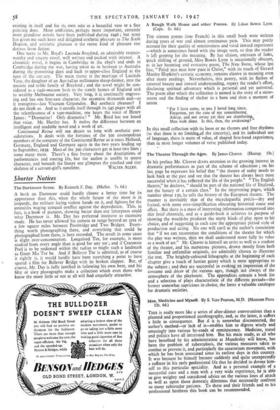The Theatre Through the Ages : . By James Cleaver. (Harrap. 15s.)
IN his preface Mr. Cleaver draws attention to the growing interest in dramatic performances as part of the scheme of education ; on his last page he expresses his belief that " the theatre of today needs to look back at the past and see that the theatre has always been most successful when it has reflected the life &the people." "The English theatre," he declares, " should be part of the national life of England, not the luxury of a certain class." In the intervening pages, which number about 130, he tells the history of the European theatre. The manner is inevitably that of the encyclopaedia précis—dry and factual, with some over-simplification obscuring historical cause and effect. But there is a mass of interesting information compressed into this brief chronicle, and as a guide-book it achieves its purpose of showing the would-be producer the many kinds of play open to his choice, and of suggesting in each case the appropriate period style of production and acting. No one will cavil at the author's contention that "if we can reconstruct the conditions of the theatre for which the play was written, then we shall understand more fully -its value as a work of art." Mr. Cleaver is himself an artist as well as a student of the theatre, and his numerous pictures, drawn mostly from both familiar and unfamiliar originals, are admirably chosen to illustrate the text. The brightly-coloured lithographs at the beginning of each chapter give a touch of fustian gaiety which is most appropriate to the subject • and they are successful m evoking impression of the costume and decor of. the ,varionsages thongh always of the
atmosphere of the playhouse. The apitendices .contain a book list and a selection of plays characteristic of the 'different periods—the former somewhat capricious in choice, the latter a-valuable catalogue for dramatic societies.


































 Previous page
Previous page